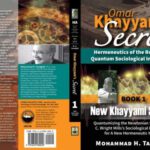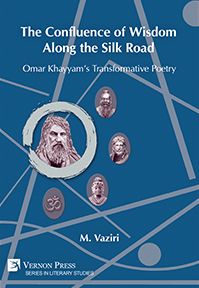Edward FitzGerald’s translation of the Rubaiyat of Omar Khayyam is one of the most famous and most illustrated collections of poetry. From 1899 to 1929, thirteen women each revealed their personal visions of the verses using line-drawings, photographs and paintings.
This and other work revealing the amazing talent of each artist is presented in 13 short and relaxing YouTube videos by Danton H. O’Day on his DantonCanada YouTube Channel (https://www.youtube.com/user/dantoncanada).
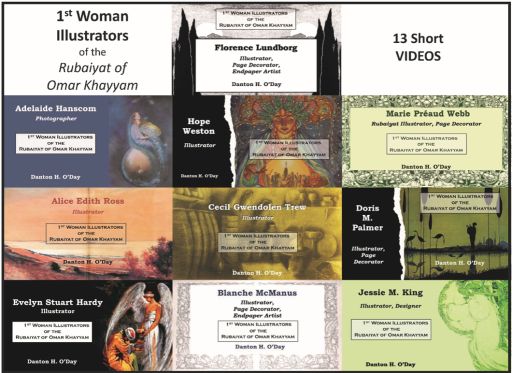
See the individual artist video links:
Blanche McManus (2:35)—McManus was the first woman to illustrate the Rubaiyat. She published two books with different sets of Illustrations. https://youtu.be/z14IXaet7VM
Florence Lundborg (1:50)— Using art deco style images, Lundborg illustrated the second Rubaiyat by a woman. https://youtu.be/ZC0H677uFHY
Jessie M. King (1:40)—A multi-talented artist, King did four, line drawings to present a gentle vision of selected verses. https://youtu.be/sO2EhAp1Cok
Adelaide Hanscom (2:43)—Hanscom was a photographic trailblazer producing the first US book illustrated with photographs and the first book featuring male nudes. https://youtu.be/Tncf2m8mCgg
Evelyn Stuart Hardy (1:28)—A prolific artist, Hardy used exquisite Persian-themed paintings coupled with simple line drawings to interpret the verses. https://youtu.be/Wg3u0yIJk-c
Marie Préaud Webb (1:36)—Webb illustrated many books using line drawings. For the Rubaiyat, Webb did four full page drawing reflecting the Persian era and locale. https://youtu.be/Z837NVwONIc
Alice Edith Ross (1:16)—A painter who left little historical evidence, Ross produced dynamic paintings reflect the life & times of Omar’s Rubaiyat. https://youtu.be/xbG4Ogi0DLY
Isabel Hawxhurst Hall (1:33)—Hall produced an impressive Rubaiyat illustrated with 18 charcoal images that reflected the Egyptian popularity at the time. https://youtu.be/xcADmNI0iQo
Mabel Eardley-Wilmot (1:27)— Using 38 unique, often manipulated, images, Wilmot was the 2nd photographer to illustrate the Rubaiyat. https://youtu.be/j-IKyE4Fnrc
Doris M. Palmer (1:18)—Palmer painted 12 full-page vivid watercolours, that reflect the Middle Eastern locale and era, to illustrate the Rubaiyat https://youtu.be/p6auU6hIiyg
Anne Harriet Fish (1:52)—An extremely multitalented artist, FISH did 19 Rubaiyat illustrations ranging from brightly coloured to sombre providing a unique interpretation of the content of the verses. https://youtu.be/S4tPpxXSUus
Hope Weston (1:17)—Weston’s 8 unique and compelling images not only provide an exciting view of the poetry they also required an explanatory forward to set the stage. https://youtu.be/aRjDeDafHdQ
Cecil Gwendolen Trew (1:50)—An historically well documented and talented artist, Trew produced 25 monochrome illustrations bringing the poetry and its Middle Eastern location to life. https://youtu.be/TyFt4iztqAg
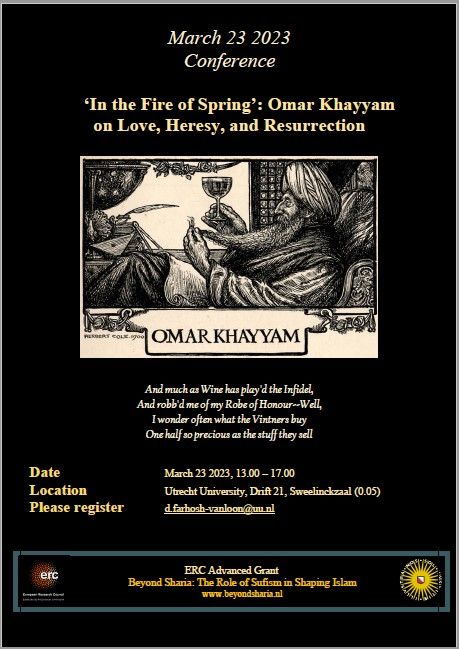 The conference is devoted to Khayyām’s philosophy, his ideas on heresy and resurrection, while also paying ample attention to his textual history and his modern appreciation.
The conference is devoted to Khayyām’s philosophy, his ideas on heresy and resurrection, while also paying ample attention to his textual history and his modern appreciation.
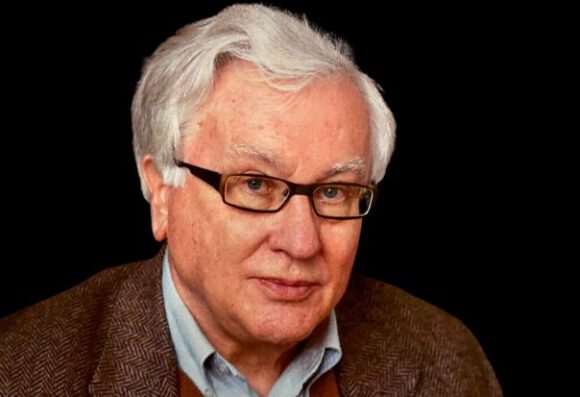 Hans de Bruijn was a member of the Nederlands Omar Khayyám Genootschap since 1997, and he barely missed one of the biannual meetings of the club. Even more than that he nearly always presented a paper on a wide range of Omarian subjects.
Hans de Bruijn was a member of the Nederlands Omar Khayyám Genootschap since 1997, and he barely missed one of the biannual meetings of the club. Even more than that he nearly always presented a paper on a wide range of Omarian subjects.
